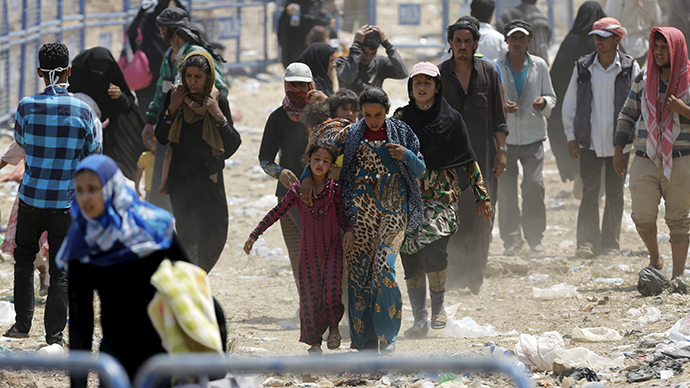A report by Amnesty International accuses world leaders of neglect as millions of refugees face “an unbearable existence,” while the world faces the “worst refugee crisis since World War Two.”
Amnesty International said on Monday that governments around the world had effectively let thousands of people, who are fleeing wars in Africa and the Middle East, die by failing to provide them with basic human protection.
The number forcibly displaced in the world is now thought to be above 50 million.
“We are witnessing the worst refugee crisis of our era, with millions of women, men and children struggling to survive amid brutal wars, networks of people traffickers and governments who pursue selfish political interests instead of showing basic human compassion,” Salil Shetty, Amnesty International’s secretary general, said in a statement. The press release issued by the organization dubbed the crisis “Worst…since World War II.”
“The refugee crisis is one of the defining challenges of the 21st century, but the response of the international community has been a shameful failure.”
Antonio Guterres, the UN High Commissioner for Refugees, said the situation in Syria is “the most dramatic humanitarian crisis the world has faced in a very long time.”
The report, called The Global Refugee Crisis: A Conspiracy of Neglect, pays particular attention to the situation in Syria, Mediterranean, Africa and South East Asia.
READ MORE: Italy threatens EU: 'Sort out migrant mess you caused or get hurt’
In Syria, almost 4 million people have been displaced due to the on-going civil war and are registered with the UN High Commissioner for Refugees, although the total number of displaced persons is likely to be substantially higher.
The burden of dealing with Syria’s refugee crisis has fallen almost entirely on Syria’s neighbors: Turkey, Iraq, Lebanon, Egypt and Jordan have received 95 percent of them. These countries themselves are often in a state of turmoil.

One in five people in Lebanon is a Syrian refugee, and with its infrastructure stretched to breaking point and its government in disarray, Lebanon has been forced to set up restrictions, which have amounted to an 80-percent drop in new registrations compared to last year.
Despite the continuing ferocity of the Syrian civil war, these countries have received almost no “meaningful international support.”
The UN’s humanitarian appeal for Syrian refuges has received less than a quarter of the funds it needs. The total number of places found for Syrian refugees is less than 90,000, or 2.2 percent of refugees in the host countries they have fled to.
READ MORE: UK offers just 90 places for Syrian refugees! Abject failure says Amnesty
The extent of the crisis was shown last weekend when Turkish border guards reportedly used water cannons to push back an influx of refugees from Syria. They were trying to escape a fresh bout of fighting between Islamic State and Kurdish militias.
The report also blasted the international community for doing nothing to alleviate the massive displacement of people across sub-Saharan Africa.An estimated 3 million refugees are thought to be living there, including hundreds of thousands who have fled conflict further in such countries as Nigeria, South Sudan, the Central African Republic and Burundi.
In 2013 less than 15,000 refugees were resettled and humanitarian appeals are shamefully underfunded, for example the South Sudan refugee response plan has received just 11 percent of what is needed.
Conflict and wars raging across the Middle East and Africa have directly caused the Mediterranean migrant crisis, which has seen thousands of people drowning.About 3,500 people died while making the sea crossing to Europe in 2014, with 1,865 thought to have perished so far this year.
Amnesty called on all of Europe to share the burden of dealing with the refugee crisis and said that the Italian decision to scale back Operation Mare Nostrum because of coast concerns had contributed to the number of people drowning.
“The European governments have pushed them back into the sea rather than resettle them,” Shetty said at the report’s launch in Beirut.
READ MORE: Situation in Ukraine ‘nearing humanitarian catastrophe’ – Amnesty Intl
A smaller scale crisis is unfolding in South East Asia, with 300 refugees dying at sea because of starvation dehydration and being abused by the boat crews. There were also incidents where Indonesia, Malaysia and Thailand refused to allow boats carrying refugees from Bangladesh and Myanmar to land, putting migrants at further risks.The Australian government was also singled out by Amnesty for its cruel policies on refugees and for making those that do make it to Australia live in “harsh, humiliating” conditions.
While Amnesty accepts that criminal gangs and people traffickers prey on the world’s most vulnerable people, combatting the criminal groups alone does not “absolve governments of their responsibility to provide protection.”
The report also warns that even in countries where refugees have found sanctuary, they must then endure racist and xenophobic abuse and in some instances they are blamed for economic and social problems.
Amnesty is urging world leaders to call an international summit on tackling the refugee crisis focusing on sharing the burden of dealing with it, and that all countries must ratify the Refugee Convention. This gives refugees legal rights and status and that saving people’s lives must take priority in all instances over implementing immigration policies.

